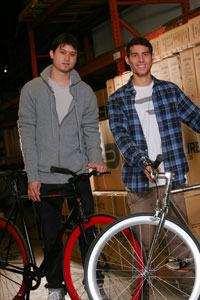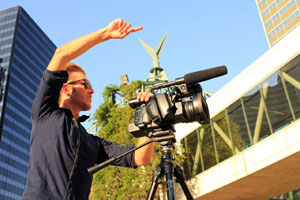
Michael Fishman (BS ’11 BUS), right, and Austin Stoffers (BS ’11 BUS) learned how to write a business plan for PureFixCycles in Chad Navis’ entrepreneurship class.
Fixed-gear bicycles were the new thing in Los Angeles when Michael Fishman (BS ’11 BUS) and Austin Stoffers (BS ’11 BUS) saw their business opportunity. This year, they expect their company, Pure Fix Cycles, to do $5 million in business.
“Teach Me How to Bucky” was only the beginning for video maker Logan Cascia (BS ’12 BUS), who was in Eagle River, Wisconsin, in June shooting a commercial with filmmaker David Zucker (“The Naked Gun”). Cascia Films, his video production company, has created commercials for Harley Davidson and videos for the Green Bay Packers.
Chad Navis, assistant professor of management and human resources, links these young entrepreneurs. He also planned to be an entrepreneur until he discovered the potential of research to minimize risk, create value and generate new knowledge. He brings his love of the topic and his insights into classes such as Entrepreneurial Management, where students, including Fishman, Stoffers and Cascia, learn how to start successful companies.
“We wouldn’t have known how to write a business plan from scratch without the entrepreneurship class,” Stoffers said, adding Navis was also always ready to talk about big ideas and help with business strategies. Stoffers and Fishman won second place in the Burrill Business Plan Competition and said the inexpensive, easy-to-maintain and easy-to-customize fixed-gear bicycles are increasingly popular on college campuses.
Cascia took the entrepreneurship class to learn how to start a business. “Just (Navis’) interest was inspiring,” Cascia said, adding he also was encouraged by entrepreneurs who spoke to the class. This year, he was invited back to tell his story. Coincidentally, Cascia also met his “Teach Me How to Bucky” partner the first day of the entrepreneurship class, when Quincy Harrison ended up in the wrong room. The men clicked: The rest is history.
The psychology of entrepreneurship
Psychology is as important as sociology and economics when Navis examines how, and to what effect, entrepreneurs pursue and give meaning to their new ventures. Psychology looks at how individuals order their world and how entrepreneurs draw on that to succeed, he said.

Logan Cascia (BS ’12 BUS) directs video production for Cascia Films, which he developed at the Wisconsin School for Business.
In his first paper, Navis found former rivals XM and Sirius did a lot right when they jointly helped the public understand satellite radio before they jockeyed for audience share. “Until people really understood what it was, audiences didn’t distinguish between the two firms,” he said. Building an overall audience benefited both companies, which have since merged. Online grocers, however, did not create a unified view of the value of their service, and most failed, Navis said. Companies invested millions of dollars to change how customers shop for groceries, and the plan could have succeeded, he said. The dot-com bubble burst, however, and funds dried up when investors were unable to recognize and separate the distinct merits of online grocers from e-commerce firms more generally.
Philanthropy supports Navis’ research, and he brings the results into his classrooms to help students bring their dream to fruition. One of the unexpected benefits of teaching has been an ongoing connection to students, he said. Navis and co-author Mary Ann Glynn from Boston College received the 2011 and 2012 IDEA Thought Leader Award from the Entrepreneurship Division of the Academy of Management for their papers about how new market categories emerge and entrepreneurial identity. Navis also is a principal in the Initiative for Studies in Transformational Entrepreneurship and is faculty director of the G. Steven Burrill Business plan Competition.
Fueling dreams
Fishman and Stoffers, both from small Los Angeles high schools, were looking for a big school experience when they chose the University of Wisconsin-Madison. The real estate majors enrolled in entrepreneurship class because they were in starting their own business. “We’ve always been really ambitious dudes,” Stoffers said. “We always wanted to do our own thing.”
The fixed-gear bikes are called “fixies,” according to the business’ website at www.purefixcycles.com. Mechanically, the cog on the back wheel is fixed to the wheel instead of having a ball bearing system that allows the wheel to spin independently. “So, on our bikes, if you pedal forward, the bike moves forward. If you pedal backwards, the bike pedals backwards. … Riding a fixie has grown in popularity because of its fundamental simplicity. Let’s just say it would be tough to build a bike with fewer parts.”
“What people see first is price and customization,” Fishman said. College campuses are usually flat, so fixies are easy to use and need almost no maintenance.
The men started their business while still in school, ordering 165 bikes that they sold in two weeks. They went to trade shows, pitched stores in Madison and then moved back to Los Angeles, where fixies have taken off. So far, they’ve sold about 7,000 bikes and operate a 20,000-square-foot warehouse in Burbank. “We’re really, really busy,” Fishman said, giving Navis credit for encouraging them and talking through strategies and big ideas.
Cascia had the Cascia Films concept in mind when he took the entrepreneurship class. He had a camera, and the class showed him how to start and grow a business, he said. When Navis liked his business model, Cascia was encouraged to start his video production company. Every new project has built on previous success, he said. The “Teach Me How to Bucky” video marketed itself, and then artists started calling him to build viral marketing campaigns. He’s mostly produced music videos and commercials, which can be seen on his website, CasciaFilms.com.
The “Packer Rock Anthem” caught Zucker’s eye, and the filmmaker emailed to see if Cascia might be interested in making a video together. Cascia hopes the relationship will continue. “It’s pretty cool to have a connection to a director without going through an agent,” he said.
